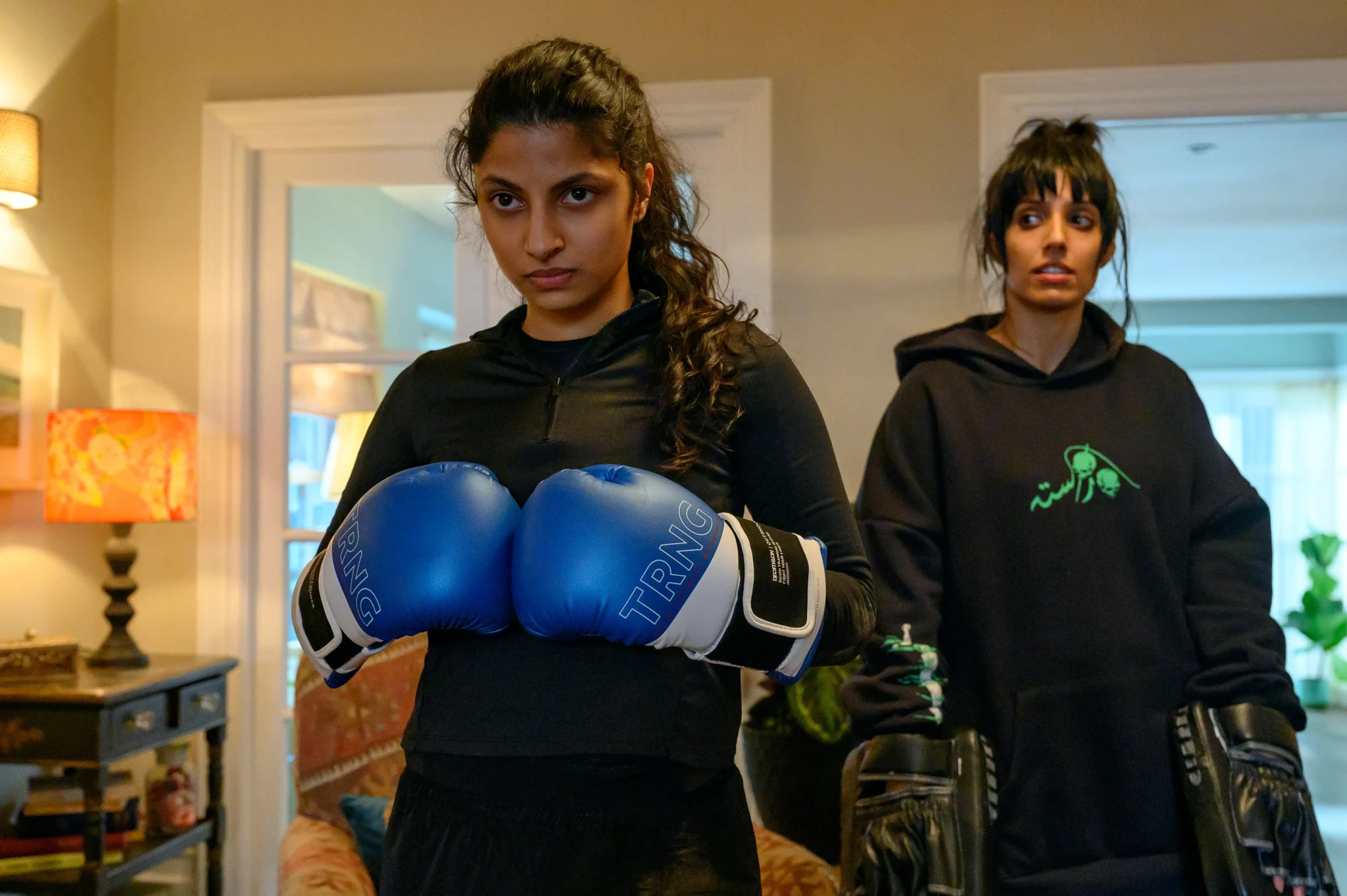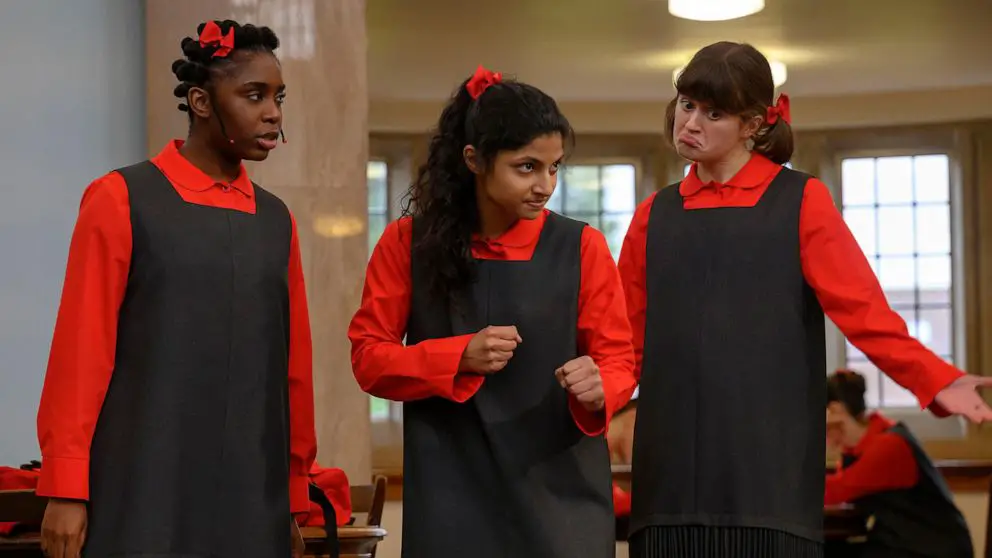There’s a refreshing sense of pure joy in Nida Manzoor’s Polite Society. A movie that seems to be a spiritual cousin to Richard Lester’s A Hard Days Night, not in a musical sense. But in the sense that it seems to capture the energy and excitement of youth reveling in being alive in the here and now.
Manzoor, who also wrote the script, understands the often exhausting energy of teenagers and the white-hot bonds of familial and societal sisterhood. Polite Society is a film about Pakistani sisters Ria (Priya Kansara) and her big sister Lena (Ritu Arya) trying to navigate a changing relationship as Lena grows up and possibly moves out. But in Manzoor’s hands, she imbues both the characters and the film with glorious punk-rock energy.

Ria dreams of being a stuntwoman, idolizing the legendary Eunice Huthart, and spends every waking hour trying to perfect her spinning roundhouse kick. Backed and supported by her best friends Clara (Seraphina Beh) and Alba (Ella Bruccoleri), the trio have their own handshake and special bond.
Kansara is a supernova of charisma and chaos. She makes Ria a tornado of adolescent neurosis and braggadocio. Her Ria swaggers through the halls while being riddled with self-doubt.
Poor Lena, however, is going through it. An art student, she is coming to terms with the notion that her passion may outweigh her talent. In a funk and forced to move back home, she soon finds herself distracted by the handsome and rich doctor Salim (Akshay Khanna). The stoner artist soon finds herself swept off her feet while her little sister watches in horror.
One of the threads running through Polite Society, underneath all the wacky subterfuge as Ria and her friends try to sabotage Salim and Lena’s romance, is that Ria believes in her sister’s dreams even when everyone else doesn’t. But Manzoor underscores that part of Ria’s fear is that if Lena can’t achieve her dream, what chance does she have?
Ria’s teacher denies her request to intern with Eunnice Huthart, a legendary stunt woman, partially because Eunnice has not written back to the several e-mails Ria has sent. But also because she doesn’t view the job of a stuntwoman as a stable career. It doesn’t help that her schoolmates mock her for her aspirations, especially Kovacs (Shona Babayemi), the school bully.
Her mother, Fatima (Shobu Kapoor), and father, Raffe (Jeff Mirza), want both their daughters to get their heads out of the clouds. Manzoor depicts Fatima and Raffe, like the rest of the characters, as neither good nor evil, as much as struggling to do their best with what they have and what they know. For example, Fatima is happy Lena has finally dropped out of art school but joins her daughters in shouting down Jaffe when he suggests Lena apply for a receptionist job.
Salim’s mother, Raheela (Nimra Bucha), is the only true villain. Bucha plays Raheela with a Snidley Whiplash vibe. She’s a “heel” with a capital H whose dastardly reasons to trick Lena into marrying Slaim I will not spoil. She would have gotten away with it had it not been for the meddling Ria and her friends.
Manzoor imbues every frame of Polite Society with rambunctious glee. Her characters are sometimes allowed to be cool and total nerds at others. There are times when Ria, Clara, and Alba will scream together because teenagers will do that. The trio exudes a glorious ignorance of the consequences of their actions, such as when Bruccoleri’s Alba goes undercover into the men’s locker room to return a stolen laptop, only to realize there are naked men in the locker room.

Alba and Clara almost steal the film, as the duo by themselves have a special brand of comedic anarchy. But combined with Kansara’s Pria, the trio becomes a comedic trinity of chicanery. Donning disguises that just barely stand up to scrutiny, and overly complicated plans, all strengthened by their infallible belief in whatever half-baked scheme they have concocted.
However, the class warfare that seems so prevalent in the first half begins to wane as the movie progresses. Still, Polite Society, while never genuinely anarchical, does have a rebellious spirit as Ria fights for her right to be whatever she wants to be while also making sure her sister doesn’t get trapped in a life of regret. Polite Society is less about the wacky antics of Ria and her friends trying to stop a wedding and battle Salim and Raheel’s evil machinations and more about Ria and Lena fighting for each other.
Ashley Connor’s camera captures the struggles of two women fighting against tradition in an immediate and laid-back way. Manzoor and Connor have crafted a goofy but sweet hang-out movie. Connor switches from, at times, feeling like a live-action anime. Such as having the characters’ names blaze across the screen in bold letters like title cards of an epic boxing match. “Khan vs Khan,” for example, before characters get into knockdown fights, breaking doors and bookshelves, only to walk it off afterward.
The fights are Manzoor and Connor’s way of showing the intense emotions behind the rows. Yes, they may have busted lips and been thrown through a door, but it is only a movie, after all. I loved the way doors, and furniture would stay broken after a fight but unremarked upon, implying that the point was the fight itself, not the reality of it.
Manzoor is unashamed of dealing with women’s bodies matter-of-factly, such as when Lena wakes up in Salim’s bed, embarrassed that she has had a heavy flow moment over his bed sheets. It’s hard to blame Lena for wanting to marry Salim after seeing his understanding reaction to her predicament. After all, sketchy or not, it’s still rare to meet a handsome doctor who doesn’t freak out over period blood-at least, in the movies.
Polite Society is a brash debut, if for no other reason because it is rare to get a movie about teenage girls that have nothing to do with boys or discover their sexualities. Instead, Manzoor is much more interested in society’s existential threat to girlhood and womanhood—the threat of conformity and tradition.
Images courtesy of Focus Features
Have strong thoughts about this piece you need to share? Or maybe there’s something else on your mind you want to talk about with fellow Fandomentals? Head on over to our Community server to join in the conversation!

